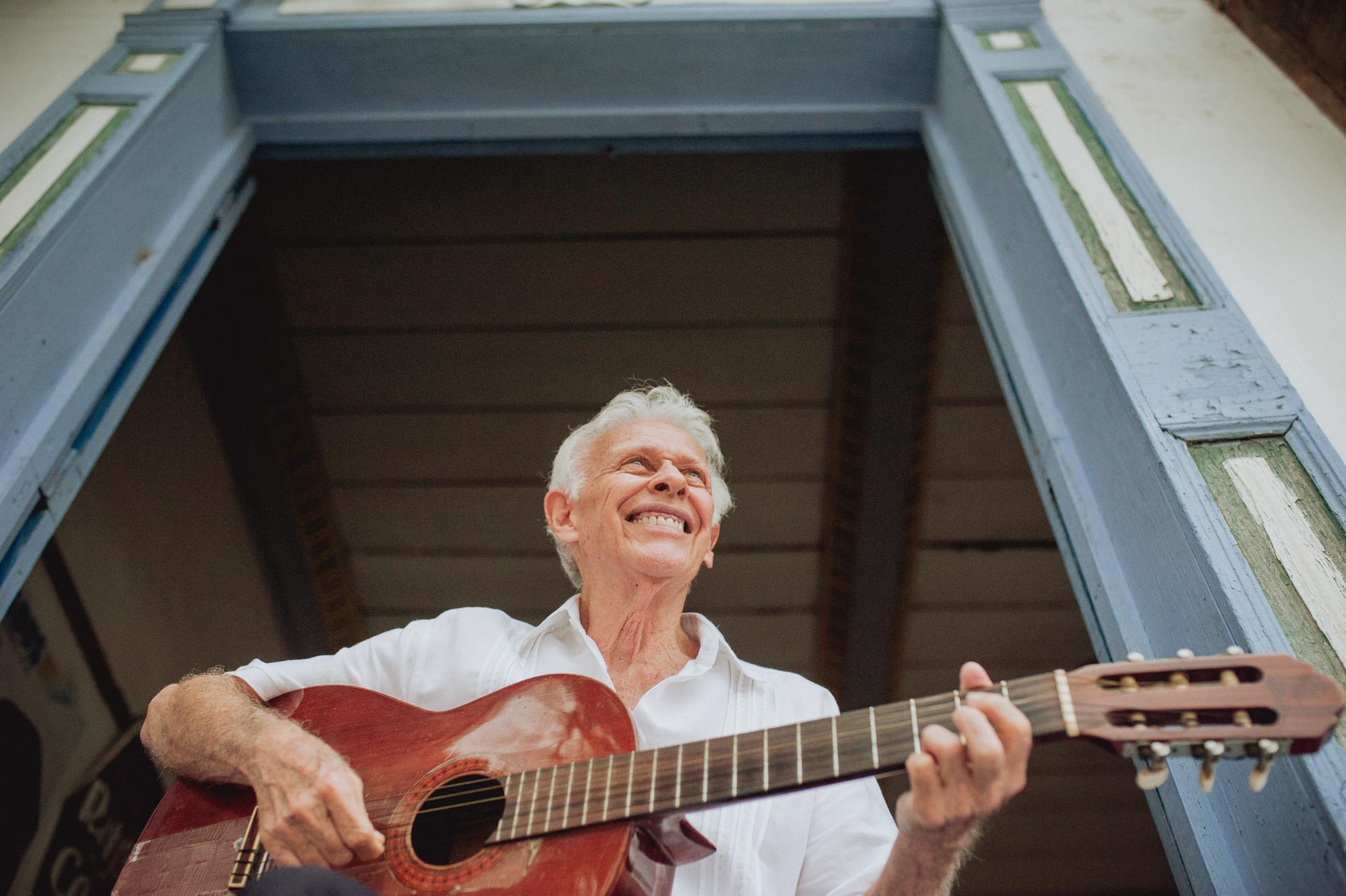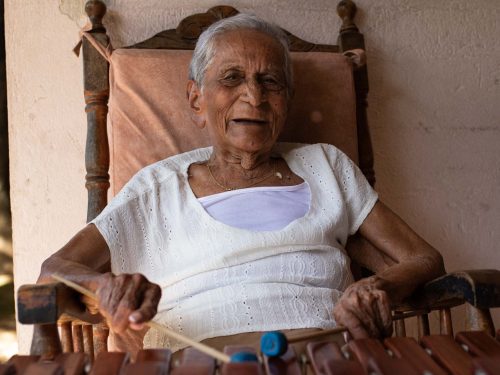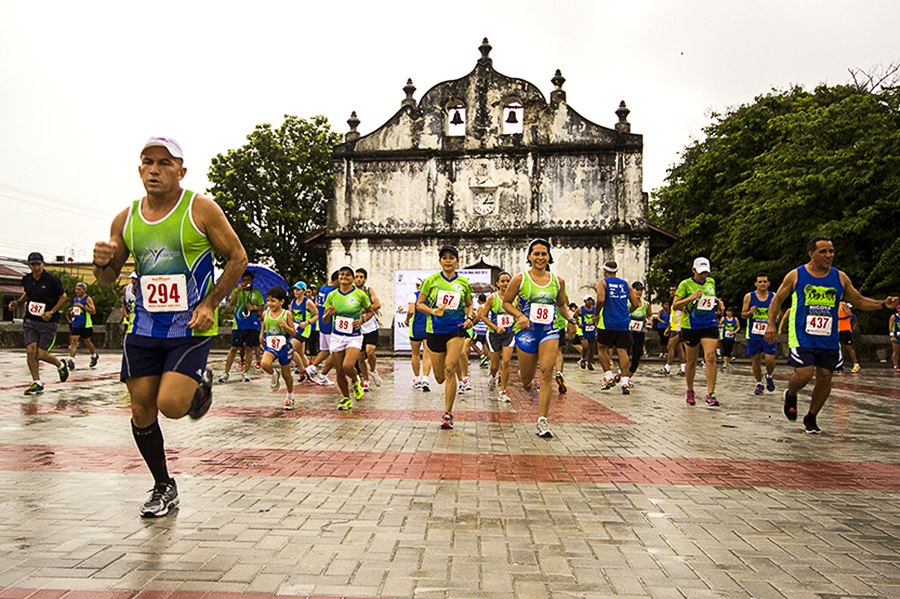
I can’t stop staring at Don Manuel’s eyes. They’re blue, sunken and still young. We’re at his home on Calle Real, and he didn’t think twice about opening his door to me, introducing his wife and offering me a refreshing beverage.
It’s Monday afternoon, and we’re waiting for a downpour to end. Don Manuel and Doña Barbarita have just finished running errands, and their laid-back, tranquil lifestyle is infectious.
I can imagine Don Manuel’s childhood, playing with the artist Raúl Zúñiga Clachar, jumping over walls and stealing the hearts of young girls on streets that were much less congested than they are now. More than a few young Liberian girls in the 1950s and ’60s would have jumped at the opportunity I have now. Back then, Don Manuel was a pop idol. All the young girls had his songbooks and they loved his eyes.

Chamorro wasn’t just a great musician with a great voice. He also wrote songs. In fact, he cut a record with only songs that he had written.
Chamorro wasn’t just a great musician with a great voice. He also wrote songs. In fact, he cut a record with only songs that he had written. Photo by Eka Mora
He says that music chose him, not the other way around. His mother was a talented soprano, and she sung to him while he was still in her womb. He grew up in a musical environment. At 5, his father hired him a guitar teacher. Later, he joined the group Flautas Cantoras de Guanacaste (the Singing Flutes of Guanacaste).
“I’ve done everything for the music, doing what I love,” he tells me happily.
At 13, he was dying to sing, and longed to be a showman. He would jump onstage at the popular orchestra concerts, when Lubín Barahona was playing, for example. He would show up with his guitar and ask for some room to sing. His eyes light up when he tells me about it.
“They gave me the space, they introduced me, and I sang, accompanied by the orchestra. People went crazy. They always wanted more,” he said.

In his house on Calle Real, don Manuel keeps some photos from his time in Mexico.
In his house on Calle Real, don Manuel keeps some photos from his time in Mexico. Photo by Eka Mora
Don Manuel could sing whatever he wanted – Rigoletto, which is his favorite opera, or any one of those operas – but he preferred instead to sing to Guanacaste, and the fiesta, and the dancing.
Even with the quality of his voice, I’m not surprised he chose a career in popular music instead of focusing on lyrical singing. I can see the passion he has for concerts, for the dancing, and also his affection for the people.
He did consider it at some point. He thought about studying lyrical singing in Milán. At this point in his life, he can speak openly about happened when he went to ask for a scholarship. The person in charge of giving the scholarships tried to take advantage of him during the interview. He ran from the office ashamed and with a heavy burden, convinced that this door was now closed. At 14, he thought maybe singing wasn’t for him. Not that way, anyway. At the time, he didn’t tell anyone what had happened. He tells me it’s the first time he’s ever told anyone.

Calle Real is certainly one of his most treasured places. He fondly remembers the Zúñiga Clachar house (Café Liberia today) as a place he went to play with his friends and neighbors.
Calle Real is certainly one of his most treasured places. He fondly remembers the Zúñiga Clachar house (Café Liberia today) as a place he went to play with his friends and neighbors. Photo by Eka Mora
After finishing high school, he went to work at a bank hoping to save enough money to study medicine in Mexico. He worked there for two years, then left. In Mexico, at 19, he met Lolita Castegnaro, a Costa Rican opera singer and teacher.
Castegnaro gave him a test, telling him that if he passed, she would give him the classes he would need. He passed and even surprised Castegnaro with the range of his voice. Doña Lolita agreed to take him on as a student at no charge, as long as he was disciplined. He couldn’t miss a single class or he would be out.
In seven years as her student, he never missed a class. For seven years he sang from 5-6 p.m., Monday to Friday, after studying. Sometimes he just wanted to party. Other times he was swamped by homework.
His years in Mexico were full of glamor and show business: contests at XEW, recordings for Capitol, nights playing at Rioma nightclub’s restaurant, tours of Acapulco and Cancún, soaking in the warmth of the people, striving to break into the entertainment world, which was incredibly hard especially for a foreigner.
During this period, he was always coming and going from Costa Rica. In 1959, he recorded “Luna Liberiana,” written by the composer Jesús Bonilla, and “He Guardado,” by composers Manuel Rodríguez and Aristídes Baltodano. He returned in 1962 to his native country and recorded several songs by Ricardo Mora and Mario Chacón.
According to Mario Zaldivar, an expert in popular Costa Rican music, you can’t talk about the subject without talking about Don Manuel.Zaldivar believes that Manuel touched many more hearts by becoming a popular singer than he would have if he had chosen the path of an opera singer.
Zaldívar said that at the end of the ’50s and in the early ’60s, Manuel Chamorro was a type of media sensation. He was a spinto lyrical tenor that sang boleritos by Ricardo Mora and Mario Chacón with a marvelous voice and a look that rounded out the picture.
His wife, Barbarita, blushes when she thinks about her husband during that period. They met when she went to Mexico to take summer courses at the university. It was a temporal love. She spent the entire summer there, and they loved each other until she returned to her life in the United States and he continued his life of music and as a student.

Barbarita and don Manuel met each other in Mexico, some decades ago. They met again all these years ago to get married and sing to each other.
Barbarita and don Manuel met each other in Mexico, some decades ago. They met again all these years ago to get married and sing to each other. Photo by Eka Mora
Every year was the same until she graduated, got married, had children, and never returned. Many years later, she became a widow. When she had time to finally think about herself again, she remembered the letters that Don Manuel wrote her, and she decided to look for them. It wasn’t easy, but she eventually inquired about him at a Chinese restaurant in Liberia. She asked the owner if he knew if Don Manuel had been married. The Chinese man said he always saw Don Manuel alone, and she felt great relief.
The next day, she called him. They talked, and then they met each other. They fell in love and ended up getting married in 2011 at Playa Hermosa de Carrillo. The months that Doña Barbarita is in Costa Rica they never stay in the house. They run around here and there, running errands. What do these two do to have so much energy at 80?
Don Manuel pulls out his guitar and we go sit in Café Liberia.
“This is the most beautiful place in Liberia,” he tells me. He alerts me that he’s going to sing. The patio fills with music, “Malagueña Salerosa,” and I even get mad that the people at the next table have no idea who he is. He finishes the song with a gesture worthy of the Palacio de Las Bellas Artes, and it becomes clear that this is exactly who he is.







Comments